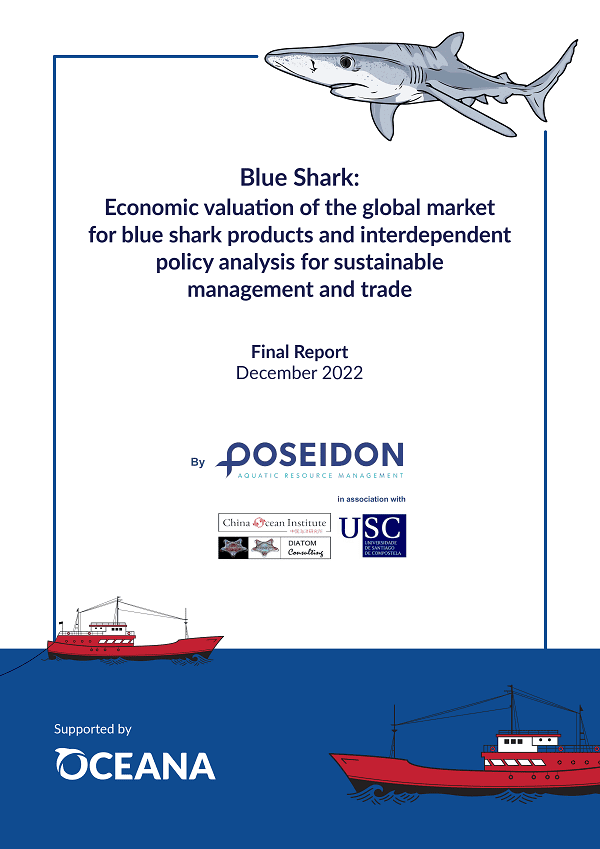Report | December, 2022
‘Bycatch’ no more, blue shark is a $411 million fishery that deserves proper management
New Oceana-commissioned analysis reveals, for the first time, the global catch and economic value of blue shark, mapping its trade and analyzing current management and conservation measures.
Three-quarters of all oceanic shark and ray species are threatened with extinction, largely due to overfishing. Blue shark (Prionace glauca), a wide-ranging pelagic shark, makes up 60% of all reported shark catches and singularly dominates both the fin trade (41%) and shark meat trade (36%). Despite being considered one of the most abundant and resilient shark species, their populations are thought to be decreasing, with their decline intrinsically linked to the lucrative shark fin and growing shark meat trade. The International Union for Conservation of Nature (IUCN) now categorizes the global population of blue sharks as “Near Threatened” and the Mediterranean population as “Critically Endangered”.
This report, prepared for Oceana, demonstrates the importance of the global blue shark fishery, for the first time quantifying its global catch and economic value and mapping the global trade network for its meat and fins. Notably, the report finds the fishery is subject to minimal management compared to other global fisheries, outlining the need for proper direct management. It argues that most blue shark catch is targeted, and that it is misleading to merely consider blue shark as ‘bycatch’ — species unintentionally caught and/or discarded when fishing for another targeted species.
Based on data reported to the Food and Agriculture Organization (FAO) and tuna regional fishery management organizations (t-RFMOs), 189,783 metric tons of blue shark were legally caught and landed in 2019, amounting to over 7 million blue sharks. Large-scale commercial fleets, mainly long-liners, harvest 90% of blue shark catches, and distant-water fishing nations catch 74% of the global blue shark catch. At the very least, blue shark landings were estimated to total $411 million, exceeding the catch value of each of the three iconic bluefin tuna species. Unlike the southern bluefin tuna which has a full RFMO dedicated to it, there is no RFMO dedicated to the conservation and management of any oceanic shark.
In light of the economic importance of blue shark and the targeted nature of its exploitation, Oceana’s Transparent Oceans Initiative is calling for improved management that supports their conservation and recovery. RFMOs, their member states, and governments of the top blue shark-catching nations, in particular Spain and Taiwan, should seriously consider these findings and begin to monitor and manage these fisheries appropriately.
- Research Summary
- Press Releases: English, Chinese (simplified), Chinese (traditional), French, German, Japanese, Korean, Malay, Portuguese, Spanish
- Full Commissioned Study
For further information on making distant-water fishing more transparent and accountable, please visit Oceana’s Transparent Oceans Initiative.
Press contact: Gillian Spolarich gspolarich@oceana.org / +1 202-467-1909




